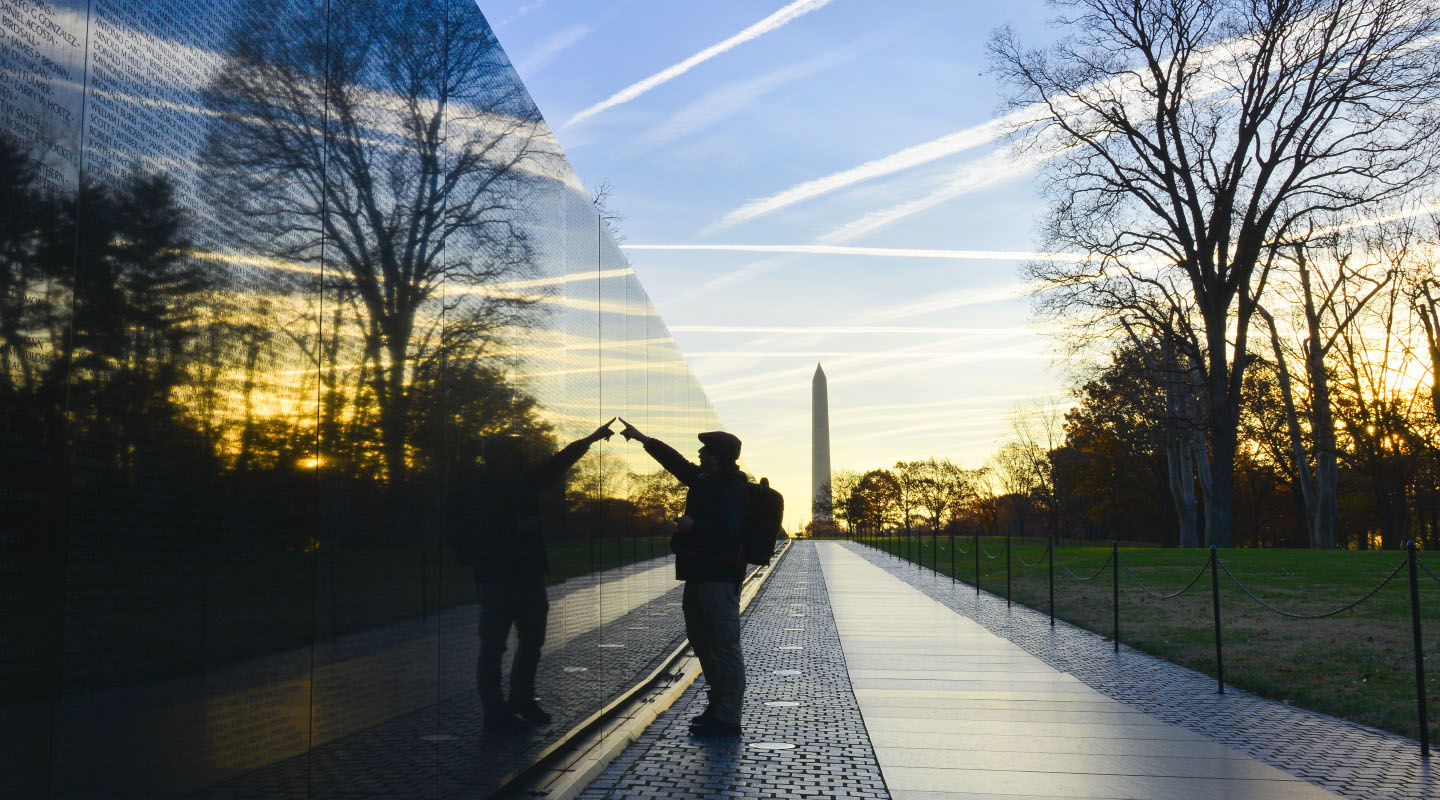Each November, we observe Veterans Day and Military Family Month in the U.S., and Remembrance Day in Commonwealth member states. At Dataminr, we recognize our former and current service professionals everyday through our Service @ Dataminr Employee Resource Group (ERG), which I have the pleasure to lead, and we support their efforts – volunteering, Emergency Medical Services, MSF/Doctors Without Borders, Federal Service, the Peace Corps, and Defense Forces – through programming, resources, and awareness. Our Service @ Dataminr ERG stands in solidarity with Black, Amigos, Pride, Women, Asian, Salam, and Parents @ Dataminr ERGs.
While the “military” and “civilian” sides of our societies may, at times, have trouble recognizing each other, I embrace holidays like this one as an opportunity to ask questions and share in dialogue. This Veterans Day, I had the pleasure of chatting with Dataminr’s Executive Vice President of the Public Sector, Jay Humphlett — a U.S. Navy veteran — about his views on the holiday this year, the intersection of the veteran and private sector communities, and the culture shift within the military.
-Andrew Miller
Andrew: Veterans Day 2020 will look very different than previous years. In New York City, there will still be a parade. But many events have been cancelled or changed to virtual.
Taking part in ceremony and ritual is a powerful, physical aspect of service – marching in formation, calling orders, saluting, etc. With changes due to pandemic precautions, how will your observation of Veterans Day look this year? Will you take a step back or look for new ways to honor the date?
Jay: To me, Veterans Day is a true day of reflection and remembrance. This day should be a powerful reminder of the sacrifice that our military veterans, current active duty members, first responders and their families shoulder. I must admit, I do struggle with what is the best way to celebrate and honor our veterans –especially the ones that are no longer with us. Parades and ceremonies are great, but I think individuals need to do whatever is required to truly understand and appreciate why veterans are such an important part of our country’s history.
To that end, the aircrew and spouses from my former squadron –Fighter Squadron 21…the Freelancers, if you’re curious — are still very connected even though it has been over 25 years since we served together. We get together from time to time (sometimes in person, sometimes virtually) to share stories, anecdotes, pictures, etc. about the time we were together, catch up on what everybody is up to now, as well as try to remember and honor our two squadron mates that perished in aircraft mishaps. Even though that is technically the purpose of Memorial Day, we still use Veterans Day as a reason to commemorate, pick each other up, and support one another.
Although I had already left the Navy, I was fortunate enough to attend both of their memorial services. To this day, I still get choked up whenever I see the “missing man” formation flown or hear Taps played. Those always bring the memories back of my time with LCDR Robert “Ernie” Sides and LCDR Bill “Paper” Muscha, and the ultimate price they and their families paid.
Andrew: Resiliency is a cornerstone of military culture, stemming from its necessity as service members succeed through physical and mental hardships. The entire world could learn a thing or two from the military community, I imagine! And conversely, the rest of the world has found unique ways to thrive during the pandemic. As a veteran, what has surprised you most about the resiliency shown by the communities you’re in touch with?
Jay: In the military you will always share a common bond with the brothers and sisters you served with. Most of us are willing to drop everything in order to help somebody that we served with, or a fellow veteran. During the pandemic, it has been encouraging to witness neighbors, classmates, work colleagues, etc. looking after each other in a way that us veterans would normally expect from one another.
It’s also inspiring to see families with young children navigating homeschooling and quarantining. The level of perseverance honed during military service is now being seen everywhere as families successfully navigate this predicament. Even though we all struggle at times, I think most folks are doing the best that can be done considering the situation we’ve found ourselves in.
Andrew: The stress of 2020 has weighed on us all. How have you succeeded in supporting others and acting as an ally? Can you share any memorable stories? Would you credit your military experience with improving your ability to mentor, lead, and practice allyship?
Jay: I have always been a huge proponent of the “pay it forward” concept. At Dataminr, I continue to feel encouraged by the steps taken by my fellow vets within the company to assist transitioning service men and women with their journey to life as a civilian.
My military experience early on instilled the importance of listening first with the purpose to understand. That in itself is a core component of allyship that I try to exemplify. The most effective leaders in the military and beyond are the ones that truly care and have a profound sense of empathy. I don’t think you can fake that. Folks can sense whether or not you’re being authentic.
Andrew: For service members and families currently dealing with deployments and other tough transitions, what is your advice and where do you draw that advice from?
Jay: Folks could write books about this because it is such a difficult aspect of military life. Having a spouse deploy and put themselves willingly into harm’s way is one of the most stressful things a marriage can be faced with. Adding children into the mix makes it that much more difficult.
In terms of how to cope, I would offer this.
First, always take advantage of the time you do have together and try to filter out the “noise” whenever possible.
Second, set realistic expectations for how much and when communication (calls, emails, etc.) will happen. Because I’m older, I deployed before the time of email and cell phones. When I was on cruise the only time I could talk with my girlfriend, now wife, was from a payphone ashore using an international calling card during very infrequent port visits. We ended up relying on “old school” communication — constantly writing letters and waiting for the 2-3 week delivery delay to “catch up” with what was going on in each other’s lives. But, we made it work.
Third, discuss how much into the details the deployed spouse wants to get into about the “home front” while they are away. Do they want to know about the garbage disposal breaking? Conversely, how much does the spouse at home want to hear about the deployment? This is tricky. My wife and I agreed that I would share everything — the good, bad, the scary. After sharing a story about missing the carrier’s arresting gear a few times and almost running out of gas in the middle of the Pacific at night, she asked me to temper how much of the scary stuff I shared. We ultimately found a happy medium that worked for both of us.
Andrew: Our country has been at war for nearly two decades, and there’s evidence of a civil-military divide. There are many ways in which America’s many cultures feel removed from the realities faced by military members, often only bridged by news media reports which can be perceived as sensational. Similarly, military culture can filter itself away from some realities faced by civilians.
As someone who has successfully transitioned from the military to a civilian career & life, what gaps in cultural understanding matter to you most? Have you ever felt personally affected by this?
Jay: Even though I think the vast majority of civilians respect and appreciate military service, I don’t think most truly understand the sacrifice and hardship that members of the military and their families endure. I also don’t think most understand what valuable lessons and experience you pick up during your time in the military. I have tried to not let myself be too impacted by this. I just don’t expect somebody that has never served to “get it,” so I don’t hold it against them. I also tell transitioning service members to appreciate any help they may receive, but not to expect special treatment.
Andrew: Thanks for chatting with me today Jay. Helping veterans transition to civilian life is important to me and others within the Service ERG and look forward to finding new ways to support the veteran community, their families, and partner organizations
Interested in joining our team? Check out our open roles.



